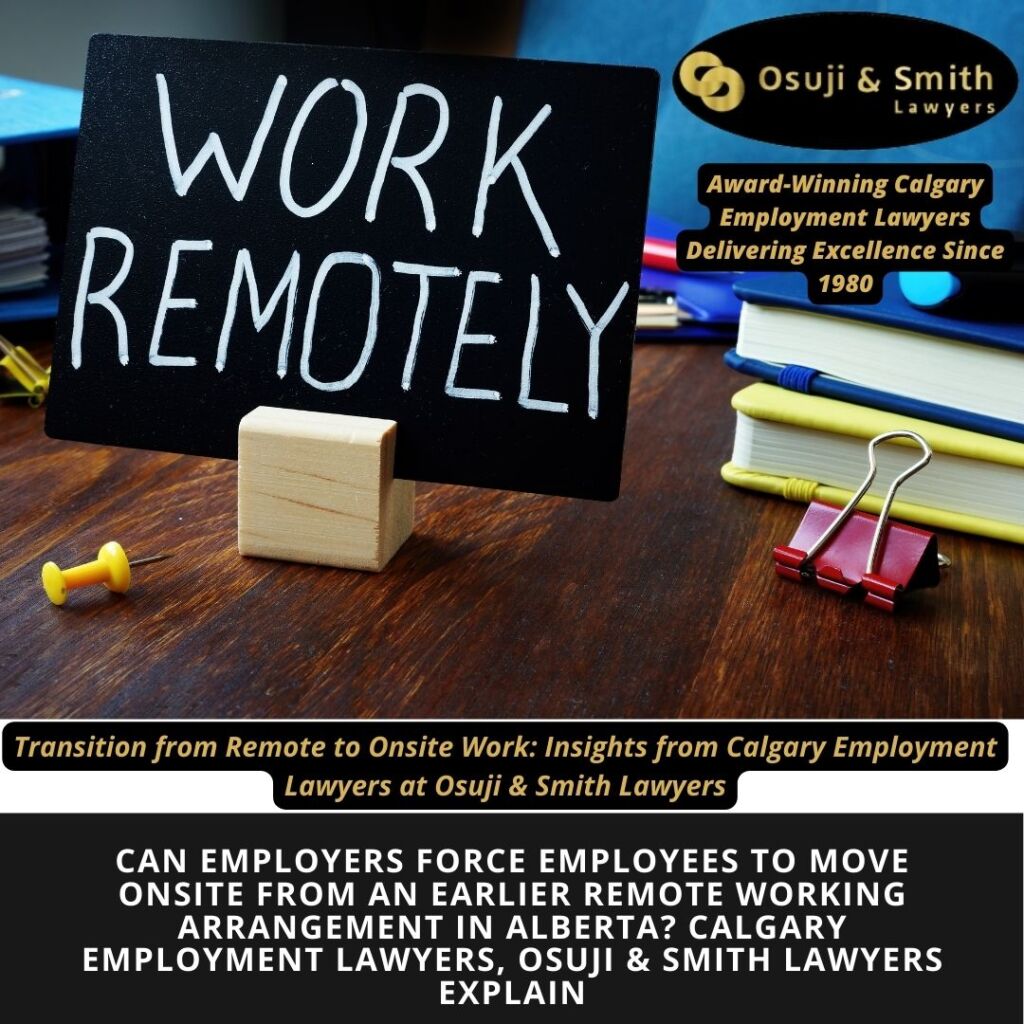Can employers force employees to move onsite from an earlier remote working arrangement in Alberta? CALGARY EMPLOYMENT LAWYERS, Osuji & Smith Lawyers explain
Navigating the Transition from Remote to Onsite Work: INSIGHTS FROM CALGARY EMPLOYMENT LAWYERS at Osuji & Smith Lawyers
The COVID-19 pandemic transformed the traditional workspace, prompting businesses worldwide to adopt remote working arrangements. While this move was initially a direct response to health and safety concerns, many businesses and employees have recognized the benefits of remote work, leading to a significant paradigm shift in the employment landscape. However, as the situation with the pandemic evolves and more businesses consider returning to pre-COVID operations, a pertinent question arises: Can employers in Alberta legally compel employees to move onsite after allowing them to work remotely? We sought the expertise of Calgary-based employment law at Osuji & Smith Lawyers to delve into this complex issue.
Context and Legal Framework in Alberta
Alberta’s employment law landscape is primarily governed by the Employment Standards Code, which outlines the minimum standards employers and employees must adhere to in their working relationships. However, the rapid adoption of remote work in response to the pandemic was an extraordinary measure, often implemented without the typical negotiations or contractual adjustments that might accompany a change in work circumstances.
Dr. Charles Osuji (Hon. D.), Managing Partner and Employment Lawyer at Osuji & Smith Lawyers explains, “The transition to remote work was, in many cases, a necessity rather than a formally negotiated arrangement. Therefore, unless there were specific contractual amendments or new terms agreed upon between employers and employees, the shift doesn’t inherently alter the fundamental terms of employment.”

Contractual Terms and Reasonableness in Alberta
The question of whether employers can insist on returning to onsite work largely depends on the terms of the employment contract. If the contract stipulates an employee’s place of work, employers might have a strong case for insisting on a return to onsite operations.
However, things get complicated with the concept of ‘reasonableness’, as Osuji highlights, “Employers must be cautious and reasonable. Directing employees to return to onsite work should involve clear communication, adequate notice, and genuine consideration of individual circumstances, such as health concerns or caregiving responsibilities that may have arisen during the pandemic.”
He further adds, “While employment contracts may not have been rewritten to accommodate remote work, a ‘constructive’ change in employment terms may have occurred if the remote work arrangement was sustained over a significant period. In such instances, forcing employees to revert to onsite work without negotiating new terms or providing reasonable accommodations could potentially amount to a constructive dismissal.”
Employer Rights and Business Interests in Alberta
Employers do maintain the right to direct their business operations, which includes determining where work is to be performed. As businesses recover and adapt post-pandemic, there may be legitimate operational reasons to consolidate teams and return to a physical workspace.
James Smith, a partner at Osuji & Smith Lawyers, elaborates, “In scenarios where collaboration, access to onsite tools, or direct supervision are crucial to business functions, employers may justify the necessity of onsite presence. However, they’re obligated to balance this necessity against their duty to provide a safe work environment, particularly in light of ongoing public health directives.”
Balancing Employee Rights and Safety Considerations: One of the key takeaways from the pandemic has been the heightened emphasis on workplace safety. Employers bear the responsibility for ensuring that any return-to-work plan complies with provincial and federal health guidelines. Furthermore, they must be mindful of employees’ rights to refuse unsafe work.
“Employees have the right to work in an environment that does not pose undue harm to their physical or psychological health,” Smith states. “If employees are being asked to return to a setting they deem unsafe, and if these safety concerns are valid and well-substantiated, they may have grounds to refuse.”
The role of vaccination mandates and rapid testing in this context cannot be ignored. Employers might consider these tools to alleviate safety concerns, but these measures introduce additional layers of legal and ethical considerations regarding personal rights and privacy.
Navigating Work-Related Disputes in Alberta
Given the potential for disputes arising from the transition back to onsite work, both employers and employees are encouraged to seek legal counsel if they believe their rights are being infringed upon. Mediation and conciliation remain valuable strategies for resolving such conflicts, ideally preventing escalation to litigation.
The question of mandating a return to onsite work in Alberta is multifaceted, requiring a careful balancing act between contractual rights, operational necessities, and individual employee circumstances. Both employers and employees are navigating uncharted territory, underscoring the importance of clear communication, mutual flexibility, and legal counsel. As organizations chart their path forward, the insights provided by experienced legal professionals like the team at Osuji & Smith Lawyers become indispensable in fostering a fair, safe, and productive work environment.

